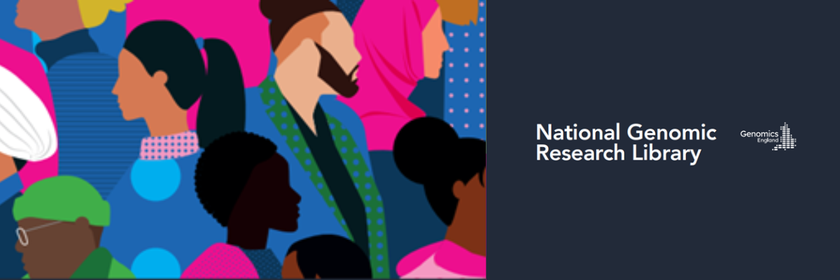Genomics England is a company owned by the UK government that works in partnership with the NHS to deliver genomic medicine. On this page we highlight some of the ways in which Genomics England supports research.
Genomics England was established to implement the UK Government's plan to sequence 100,000 whole genomes (opens in a new tab) and integrate genomic medicine into routine NHS care. Genomics England focuses on providing whole genome sequencing diagnostics, enabling scientific research, and improving diagnoses and treatments for patients.
Genomics England has three key areas of focus:

National Genomic Research Library (NGRL)
The Genomics England National Genomics Research Library (opens in a new tab) (NGRL) has one of the largest genomic data sets enriched with clinical data. It enables scientists from academia and industry to make discoveries, laying the foundations for personalised medicine for rare conditions and cancer.
Patients who are being tested by the Genomic Medicine Service using Whole Genome Sequencing (WGS) can choose to contribute to the NGRL.
The NGRL is a secure national database managed by Genomics England, a company set up and owned by the UK Department of Health and Social Care. It allows approved researchers to access data and samples to study conditions and look for new treatments that might help your patients and others now or in the future.

Generation Study
The Generation Study is evaluating the potential of identifying actionable childhood-onset rare genetic conditions following birth, by sequencing and analysing 100,000 babies’ genomes. It is being led by Genomics England, in partnership with NHS Trusts across England
The Generation Study has three main aims:
- Identify rare conditions in babies earlier. The Generation Study will evaluate the utility and feasibility of using whole genome sequencing (opens in a new tab) (opens in a new tab) to screen newborns for a larger number of childhood-onset rare genetic conditions, with the aim of improving their health outcomes and quality of life through more timely diagnosis and access to care and treatment.
- Enable research. With parents’ consent, babies’ genomes and health data will be accessed for the purpose of wider research around genes and health, to facilitate investigation into new testing and treatments for genetic conditions. Approved researchers can access this data within a secure database called the National Genomic Research Library (opens in a new tab) (opens in a new tab), though the participants’ identities are not disclosed.
- Explore the risks and benefits of storing an individual’s genome over their lifetime. Genomics England and study researchers will continue to engage with the public, parents, healthcare professionals, rare disease communities and policy-makers, looking at the possible benefits and risks, as well as ethical and practical implications, of storing an individual’s genome over their lifetime.
You can find the current list of conditions included in the Generation Study here (opens in a new tab) (opens in a new tab).
The Generation study in our region
In the East Midlands and East of England we currently have four hospital sites actively recruiting families to the study:
- Cambridge University Hospitals NHS Foundation Trust
- Norfolk and Norwich University NHS Foundation Trust
- University Hospitals of Derby and Burton NHS Foundation Trust
- University Hospitals of Leicester NHS Trust
One further Trust, Nottingham University Hospitals NHS Trust is in the set-up phase and is anticipated to begin recruitment in the coming months.
Registering interest to take part as a member of the public
Members of the public wanting to register their interest in participating in the Generation study can do so on the Genomics England website here (opens in a new tab).

